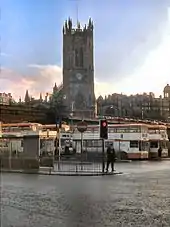Bus deregulation in Great Britain
Bus deregulation in Great Britain was the transfer of operation of bus services from public bodies to private companies as legislated by the Transport Act 1985.
History


_-_geograph.org.uk_-_2919099.jpg.webp)
At its peak in the 1950s, the London Transport Executive owned a bus fleet of 8,000 buses, the largest in the world. In the early 1980s much of the British bus network was in public ownership, either by the state owned National Bus Company or by municipal owned bus operators. It was regulated with operators not subject to competition.
The Thatcher Government commissioned a white paper into the bus industry. This resulted in the implementation of the Transport Act 1985 on 26 October 1986 and the deregulation of bus services in England, Scotland and Wales. Deregulation did not apply to London Buses which in April 1989 was split into 11 quasi-independent companies that were privatised in 1994/95.[1]
The Act abolished road service licensing and allowed for the introduction of competition on local bus services for the first time since the 1930s. To operate a service all an accredited operator was required to do was provide 56 days' notice to the Traffic Commissioner of their intention to commence, cease or alter operation on a route.
Almost immediately existing operators faced competition on their most profitable routes, both from new and existing operators, and other municipal operators seeking to increase revenue. This would often result in the incumbent operator retaliating by starting up operations on the new operator's home turf. Tactics included cutting fares and operating extra services.
It also provided for the privatisation of the National Bus Company which was divided into 70 separate legal entities and sold, with the sale of National Coach Holidays to Shearings in July 1986 the first.[2] Many were sold in management buyouts, including some 24 which introduced employee ownership in the form of employee share ownership plans.[3] However they quickly began to be bought out by transport companies Arriva, First, Go-Ahead, National Express and Stagecoach.
The Act required that operators be run at arm's length from local authorities and thus their operations were transferred to separate legal entities.
Effects
Bus wars
Intense competition sometimes resulted in a bus war, requiring the intervention of the authorities to stamp out unscrupulous or unsafe practices.
In 1988 Southern Vectis became the first operator to attract the interest of the regulators when the Office of Fair Trading forced it to allow competing operators access to Newport bus station.[4] It was also reprimanded for operating extra services purely to stifle its competition.[5]
In 2000 Stagecoach Manchester was found to have been employing bus inspectors to usher passengers away from competitors' services.[6]
In 2004/05 Cardiff Bus was found to have engaged in predatory behaviour to stifle competitor 2 Travel.[7][8]
In 2006/07 Stagecoach Manchester and UK North engaged in a bus war on route 192 and on the Wilmslow Road bus corridor that caused traffic chaos in Manchester.[9][10] UK North were found to have been engaging in unsafe work practices with two managers jailed.[11]
In November 2009 the Competition Commission ordered Stagecoach to sell Preston Bus after it had adversely affected competition in the area forcing Preston Bus to sell in January 2009.[12][13][14]
Bus wars still periodically occur, in 2011 Connexions and Transdev in Harrogate were engaged in Wetherby.[15]
Ownership
Only 12 operations remain in public ownership, the largest being Lothian Buses in Edinburgh.
As at 2010 the big five operators, Arriva, First, Go-Ahead, National Express and Stagecoach, controlled 70% of the market. With the sale of Arriva to Deutsche Bahn and Abellio, ComfortDelGro, Transdev and Veolia Transport also owning operations, 24% of operators were in foreign ownership in 2010.[16] This has increased with RATP Group and Transit Systems having since entered the market.
See also
- Deregulation and privatisation of the PTE bus operations
- Privatisation of London bus services
References
- The Sale of London Transport's Bus Operating Companies National Audit Office December 1995
- Holidays leads NBC sell-off Commercial Motor 19 July 1986
- http://www.grahamstevenson.me.uk/index.php?option=com_content&view=article&id=773:british-bus-deregulatiion
- Vectis forced to share Commercial Motor 25 February 1988
- Turner rebukes S Vectis Commercial Motor 14 April 1988
- Stagecoach found guilty of bus war dirty tricks The Independent 3 December 2000
- Bus firm predatory tactics claim BBC News 15 May 2007
- Cardiff Bus Archived 16 August 2013 at the Wayback Machine Office of Fair Trading 2008
- Council concerns over 'bus war' BBC News 3 April 2006
- Bus wars: Get it sorted Manchester Evening News 15 February 2007
- D-Day for 'bus wars' bosses Manchester Evening News 18 April 2010
- Preston Bus to be Sold Archived 19 October 2013 at the Wayback Machine Competition Commission 11 November 2009
- Company must sell 'bus war' rival BBC News 11 November 2009
- Stagecoach must sell Preston Bus Lancashire Evening Post 11 November 2009
- Bus service war erupts in Wetherby Wetherby News 8 July 2011
- Foreign ownership on the rise busandcoach.com 15 February 2012